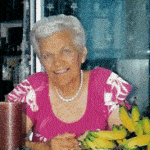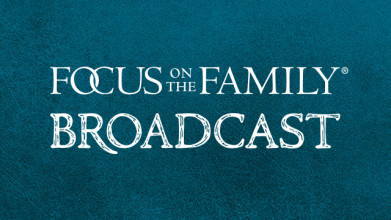Hitler: (Speaking in German)
Crowd: Sieg heil! Sieg heil! Sieg heil!…
John Fuller: Those are the sounds of a nation that was totally deceived, throwing itself at the feet of Adolf Hitler, who was eventually responsible for the deaths of millions of innocent people. Today on Focus on the Family, we’ll hear from a woman who walked away from the Third Reich, and lived to tell about it. Your host is Focus president Jim Daly and I’m John Fuller.
Jim Daly: John, this is an amazing personal story that will take us back to World War II and the years preceding it. It’s the story of Maria Anne Hirschmann, whose nickname is, “Hansi.” She was just a preteen when Hitler’s tanks rolled into her native country of Czechoslovakia in 1939, and I don’t wanna give her story away, but that’s where we’re headed. Hansi’s a former schoolteacher, a speaker and an author. She’s the mother of five, and grandmother of many. This is a powerful story in the tradition of Corrie Ten Boon whom you’ve also heard on this broadcast, and like most of those who survived the horrors of World War II, Hansi has a story of courage under fire. It certainly captured my attention, I know it’ll capture yours as well.
John: Let’s get started, here’s Hansi Hirschmann speaking to a group of military wives at Fort Stewart, near Savannah, Georgia just before Operation Desert Storm in 1990 on Focus on the Family.
Hansi Hirschmann: And I never dreamed that I would ever be an American, ever speak English, and ever pray a prayer that somebody might see the Lord Jesus while I speak, because where I’m coming from, there wasn’t a chance in the world that I could do either of those things. I was born in Czechoslovakia, in a m- in a German language, uh, group, and after World War I, times were so hard that, uh, the minorities especially in Europe and, we Germans were the minority in Czechoslovakia, um, we just didn’t have food and hope, and work, and, uh, er, eh, when my momma gave birth to me, it looked very, very bad, because she was not only sick.
Papa didn’t have, uh, a job, but she also did what you just don’t do in the German culture of that time… she gave her husband three girls, and no son, and just… that isn’t done. And so when I was born, my papa said, “Yuck, it’s another girl,” and he threw me into the cradle, and momma watched and knew that if she died, she would leave three orphans, and that’s exactly what happened, and three girls were raised by strangers, including myself, because my papa didn’t want girls. And I grew up a little bit, um, well, according to the American way of description, you would call it a blighted or a very, very restricted childhood, because I slept in a hay loft.
I, um, was very often hungry. I never had shoes in the summer, very often not-fitting shoes in the winter, and I can prove it with my crippled toes today, and on top of it, I somehow knew that nobody needed or wanted me, and that’s a hard way of growing up. It’s under that shadow of rejection, and on top of all the other things that I had against me, um, that precious foster mo- woman who raised me, and whom I called, “Mother,” wanted to do it because she wanted to do something for Jesus Christ, but somehow her religion was such that she taught me that, “When we are good, God loves us, and when we are not good, when we are naughty, then God has to punish us.”
And, I was the type of a kid, and I said that before… the Germans called us, “schwarz das Schaf, the black sheep,” that’s not a skin color, that’s a personality, and I told you before the Americans have another name for that c- and child, and it can come in every, uh, skin color, uh, white, Black or in between, and you call it, “The creative child.”
Audience: (laughs).
Hansi: And, “The creative child,” is the kid that is always in trouble, because it doesn’t fit into the forms that society has for children, and I was in trouble because I just couldn’t do what people told me to do, mainly to be quiet, and the second thing was, I had always, I always ask, “Why,” and that just wasn’t allowed in my culture. You were quiet. You learned to obey, you did it because you were told to do so, not because you understood it, and so I was in trouble from babyhood on, and so I got the idea that, “Nobody liked me, but God didn’t either, because I was a naughty kid,” and so there was nobody to go to, and I wondered where I would go with my life, and just as I was entering teenage, over the mountain pass, uh, some troops came in with a red flag, with the white circle and the black cross with the hooks, the Americans call it, “The Swastika,” and Nazi troops marched into my country and made Czechoslovakia part of the Third Reich.
And let me repeat it again that you might understand what happened. When Adolf Hitler came, he promised us food and hope, and work, and we had neither. In the first few months it looked like everything he promised came true, and we believed him, and people trusted and believed that that was something good. And then educators, uh, went through the German schools of my, um, of the area where the Germans lived, and we were tested, and somebody picked me… the poorest kid of the village and said, “You’re going to go to Prague, the capital of my country, and there we train you as a Nazi youth leader,” and folks, for me, it was a fairytale come true, because I couldn’t even go to high school or college.
I was the poorest kid of the village. You had to have money to go on with school… suddenly somebody offers me a free education. I thought I had the rainbow at both hands, and I was so excited, and everybody was excited with me, and everybody felt very honored. The only one who was very troubled was my foster mother, but she never said anything. She just put me on that train, and the train pulled me away, and she reached after me and she said, “Vergiss Jesus nicht, don’t forget Jesus,” she had taken me in to te- teach me about Him.
And the Nazis did something that, the Americans have a word for it… you call it, “Brainwashing,” took the Nazis one year of brainwashing and I had forgotten the God of my mother, and within one year, I was a totally convinced Nazi. Brainwashing is a very, um, shall we say, “A very, a very deceptive thing.” People don’t know when they’re brainwashed. Brainwashing happens when somebody gives you one side of a story, and they give it long enough to you that you believe it. It’s exactly what happened to us. We were told we were the German superrace, we were called to conquer the world and make it a better place of life for everybody, and we were also told that the great supreme power… see they never- never took our faith in God away.
And they said, “The great supreme power had chosen Hitler and the German race to be the savior of the world.” Now you tell that to a kid on the hay loft, uh, out of the hay loft, what an honor. I couldn’t believe that- that I had such a great calling. I believed it, I went for it. The Nazis brainwashed me completely and at the end of World War II, I was a very high Nazi youth leader who believed with all her heart, ever so sincerely what the Nazis told me, and at the end of World War II, Germany woke up to the fact that they had believed the wrong leader and the wrong cause and they paid for it, a horrible price.
I ended up in a communist labor camp and, (laughs), I don’t like to talk about such things, and in that communist labor camp, um, they were so cruel to us, and they treated us like animals, and a lot of people died, and I came to the place I hated those Russians, I hated those Czech communists, and I hated everybody who had come into, uh, to- to win World War II against us, including the Americans, but I decided that I would not wait in that labor camp until I died, as some others did, but I would escape. I just walked out of that place, and I got into the German territory, and in the German territory of Czechoslovakia, somebody said to me, “If you want to get away from the communists, go to the American military zone.”
And I said, “What’s that?” I’m not a German, I’m a Czechoslovakian who speaks Austrian German. I had never been in Germany at that time after World War I and, uh, II. Somebody said, “There is in the west of Germany some areas… the English and the French and the Americans have a territory they call a military zone,” they said, “If you can flee to the American military zone, that’s the best place to go,” because the American military government gives you enough to eat, and then the American soldiers are not quite so cruel, and look, when they brainwash you, they set your head in cement, and I was still a Nazi, and I said, “Hey, why should I go to the Americans, they’re as bad as the Russians, I don’t trust them… there is no way, they will be just as mean.”
And all we had was rumors, and so I didn’t know what else to do, I had to get away from the communists, and so my girlfriend and I decided we would flee to the American military zone of West Germany, and as I have told some of the kids in school, you know, it’s very hard sometimes for Americans to picture refugee life, because when you watch on television, anybody fleeing… they always flee in a Mercedes, have you noticed that?
Audience: (laughs).
Hansi: Just, “Rum,” mission impossible.
Audience: (laughs).
Hansi: And- and- and when you really flee, you flee with your feet, you walk, and you starve, and that’s what we did. We walked endless miles, 100s of miles in the rain, many people died, and the reason why I lived, I know today is because there was a God, the God of my mother who protected me. I found that out later when I found my foster mother and she said, “I prayed for you every day, and God answers prayers,” and God was with me, even though I didn’t believe in Him anymore, and, you know, as a child, I had been so poor that I knew all the edible things in the wilderness, the roots and the mushrooms and the herbs… we lived on that.
I forgot how food tasted after a few weeks, and we just moved toward the west, and then we finally came to a village, and found out that we couldn’t move on, because behind the village was No Man’s Land, and I didn’t know what a No Man’s Land was, nobody had told me, and they said, “It’s a stripe of land several kilometers wide that you’re not allowed to cross because the Russians patrol it,” and I said, “Why can’t we cross it,” they said, “The American military zone is behind it,” and I said, “That’s where I want to go.”
Audience: (laughs).
Hansi: And they said, “Don’t we all,” the refugees said, and I said, “Why don’t we go,” and they said, “We told you, they shoot you, they patrol, they kill you,” and I said, “Well, they’re not gonna stop me,” and the following night I had found somebody… we had given him all our valuable things, and that ferryman down at the river promised us he would take us over to the American zone, and it seemed like he would. We were a whole group of people, and folks right now when I came on this base, it was almost like the past came back, because Germany at the end of World War II had no men, and I walked into a place where there were no men, and I thought, “It’s like the past,” and I look at you here, and there’re mostly women, and that’s what it was at the end of World War II, and in an entire nation.
Our men were just either in prisoner-of-war camps or didn’t come home, and so here we- we- we have that situation of all women and children and old people, and the entire group was led by that guy over to the American zone. I want to believe it was an accident, he led us straight into a Russian death trap, and we had the guns on us suddenly, and there was shouting and shooting, and I still remember it was just the last few 100 yards before we made it over to the American side, and suddenly the guns are on us, and I was laying behind a bush and all I could think of was, “If I die right now, why was I born, why was I alive, and where am I going,” and it suddenly hit me, I had no answers.
Let me tell you folks, I wish that you all might understand no matter what age you are, where you are coming from, or where you are going that you better decide now where you go in case there comes a time where you wonder if you will live, and you better decide it now.
John: You’re listening to Focus on the Family. That’s Hansi Hirschmann, and we have a CD of her entire presentation, with extra content, so you can listen to it again, or share it with a friend, it’s real easy to do that. Uh, we’re making that available for a gift of any amount to the ministry of Focus on the Family today. Call 800-A-FAMILY, or, uh, donate and request that CD at our website, focusonthefamily.com/broadcast. Let’s go ahead and return now to more from Hansi Hirschmann.
Hansi: And I think that it is so good here in American that you can find out. See I couldn’t, in Nazi school they didn’t teach me. There was no way that I could find an answer, and I was laying behind that bush and I thought, “I’ve got to find out if there’re some answers,” and I said to my girlfriend who was with me, I said, “You know, the Russians are waiting for us to come out and surrender,” and I said, “We’re not surrendering, do you hear me, we are running past the guns.” She said, “Okay,” she was one of those blonde, scared little things.
Audience: (laughs).
Hansi: (laughs), I was a born and trained fighter, (laughs), yeah, I was always giving the orders and I said, “Now remember, zigzag, and run as fast as you can, don’t give a steady aim,” and I just gave all those- those whispered orders, “Okay,” (laughs).
Audience: (laughs).
Hansi: And I tried to catch that spirit, that courage to finally just run past those guns in front of us, because we knew, regardless which way we went, we were caught, and I thought, “If I run any way, I go, I go over to the American side and see if I can make it,” and so my- my girlfriend and I just got ready to run when we heard a child cry, and I worked my way over and found a little kid, probably two and a half or three years old… a little girl, she had lost her mother and baby brother in that whole commotion when the Russians were shooting, and they didn’t shoot anymore, they were listening. They knew they had us, they just waited for us to come out.
And here was that kid and I thought, “Oh, what do I do with that little kid,” mother and baby brother were- were gone, and we took that kid between us and we dragged her between us across the guns, passed a river, up a hill to the American side, and we made it, in absolute silence, not one sh- sh- shot, not one shouting, the only thing you could hear was that gargling of that water when we fought through the river, and then we finally made it over there. You know, at such a moment, you don’t stop to turn around and find out why the Russians didn’t shoot.
Audience: (laughs).
Hansi: I just… it suddenly hit me, “We made it,” and, uh, I have often thought about it, “Why we did,” and I- I can think of several things, and perhaps one of them is that the Russians didn’t have the heart to shoot at that little kid, but whatever it was, suddenly we find ourselves on the other side dripping wet, and we have that little kid there from here on down, and I see a l- a light in the distance and I think, “Nobody will open the door,” because I knew that no Ger- German farmer would help us, they didn’t, but I thought, “I’ll try it once more, or she’ll die of a pneu- uh, of a pneumonia,” and I thought, “I get toward that light, and I’ll just hammer on that door and put my foot in the door when they open it,” and I’d just say, “We don’t want anything from you, just take that child in, she’ll die of a pneumonia,” we’re so cold.
And so as I was getting to that building, I should have known that didn’t look like a German farmhouse, long low building- building in the middle of the woods. I hammered on that door, the door opened unexpectedly soon… in the doorframe stood not a German farmer, but an American soldier, and I want you to know, I have never ever in my life ever been so scared… then, and since then. That was the most scary moment in my life, because I looked at that guy, and he looked exactly the way that the Nazis said any American would look, and the Nazis had told us that the Americans as a whole were very wide and big people, because they liked to eat so much.
Audience: (laughs).
Hansi: The first American soldier that I ever saw… the first American I ever saw, that soldier, filled the doorframe-
Audience: (laughs).
Hansi: … I looked up at him and I thought, “Oh, they are as big as they said.”
Audience: (laughs).
Hansi: And then they told us that any American man had a gun on his hip, and they would shoot without looking, and people dropped dead, and he had a Russo revolver, he had a huge gun here on the side, and I thought, “He doesn’t even need to look down, all he needs to do is pull the trigger, and we’re gone.” They- the Nazis had told us the Americans were absolute barbarians, they had no culture, and they said, “One of the reasons that they proved it to us was because they deliberately smacked, they smacked their lips loud.” Now when you come out of a German background, the first thing you teach your baby is, “Close your mouth, don’t smack.”
Audience: (laughs).
Hansi: You just don’t ever smack, and they said, “The Americans smack,” and they take little pieces of gummi, and gummi is rubber, and I had never seen rubber in any other form but rubber shoes or tires, and they said, “You di- dip that, they dipped that into a sugar solution, and then they’d chew on it, and smack it.”
Audience: (laughs).
Hansi: And so I had it figured out, “You cut tires apart.”
Audience: (laughs).
Hansi: And you dipped it into sugar solution, and you chewed on a tire.
Audience: (laughs).
Hansi: And folks I would try to figure out, “Why somebody would chew on a tire?” We had been hungry for years, you know, starving in Germany, we had never gone that far.
Audience: (laughs).
Hansi: Had never seen anybody chew a tire in his li- in my life. Guess what that American soldier did-
Audience: (laughs).
Hansi: … that guy had a whole tire in his mouth.
Audience: (laughs).
Hansi: Folks, I was so scared, I couldn’t move, and when we finally tried to communicate, I realized we couldn’t talk, I spoke German, Czech and Russian, and he spoke, (laughs), English, we just could not communicate. He brought an interpreter and that interpreter, um, uh, just explained to us that, uh, I should talk and, uh, what was our- our wish, and I just looked at that soldier and I said, “Tell that soldier, we didn’t mean to come here, please let us go, uh, uh, um, don’t do any harm to us, uh, pl- please, and just take the child, and she will die of a pneumonia, her mother and baby brother are in the woods, just- just let us go and take the child in.”
And the American soldier stood there, and he invited us in, and he will never know how scared I was, because I looked at him and I thought, “If he invites us in, then he locks the door, and then we are at their mercy,” but, you see, you don’t argue with a, with a guy who has a gun on his hip.
Audience: (laughs).
Hansi: So we just… I just walked in, and I looked around, and I wondered what would happen next, and I told you, “I was a born and trained fighter,” no Russian had ever laid ha- hands on me. I had watched other people being murdered and- and hurt, but nobody had ever touched me, and I was, uh, determined that, (laughs), nobody was gonna touch me, and I was just looking around waiting that anybody would come near me, and I fight until they kill me, and those American soldiers just didn’t seem to want to fight with me, (laughs).
Audience: (laughs).
Hansi: They- they brought, uh, food and a cot and a blanket for the little kid, and then, um, uh, one guy, and- and- and the kid was falling asleep, and so I said to my girlfriend, I said, some of the soldiers had left and I was so scared of all of them, and I said to my girlfriend, I said, “As soon as they’re done, watch closely, let’s just move out,” and so we etched toward that door that had that X, I- I couldn’t read, “Exit,” I didn’t know what that was, but I figured that was a place to go out, and so I etched toward that door, and here, (laughs), is that American soldier who says, “Come back,” (laughs).
I stood there and I looked at him and I said, “Was wollen Sie? What do you want?” And he looked at me and he said, “You tired, tired, sleepy, you come and you sleep,” and he pointed at a door, and I thought, “That’s it,” I knew it was coming.
Audience: (laughs).
Hansi: So, I looked at him and I said, “Nein-
Audience: (laughs).
Hansi: … no,” I’m not going in there. And, you know, that guy knew what I was thinking. He looked at me and he said, “Listen,” he said, “Me American, you understand?” Well, I understood that much, and I said, “Ja,” and I thought, I- I thought, “Does he think I’m stupid?”
Audience: (laughs).
Hansi: I have seen his war- his uniform in Nazi war films, sure I know he’s an American. Then he looked at me and he said, “Me no Russian, you understand that?” No Russian, yeah, yeah. Then he looks and says, “Good man, good man, you understand?” And I said, “Yeah.” He said, “Good man,” he said, and he opened the door to the first aid building and he mo- motioned us in, and I thought, “I can’t leave,” there were cot- two cots and blankets in it, I thought, “Okay, I go in and I fight later.”
Audience: (laughs).
Hansi: So, I went in and I said, “Yeah,” and listen that guy closed the door from the outside, and I heard the steps go away, and I said to my girlfriend, “We can’t both asleep, one has to keep watch, they’re going to do something to us,” and I said… and by that time we both were gone, we were totally wiped out, totally exhausted, half-starved, it was just… we were out. And I don’t know how long we slept, but there was that, um, knock on the door, and the- the- the- the- the door opened and we came out of that exhausted sleep… I forgot where we were and went, “Who is it, what do you want,” and in the doorframe stood an American army cook.
You guys, you know how an American army cook looks?
Audience: (laughs).
Hansi: Do I need to remind you, (laughs)? Uh, I have met a lot, they all look the same-
Audience: (laughs).
Hansi: … not so much anymore now, because they have to run so much, but there and during World War II it was different… that American army could, eh, you know, he had that big round face with that healthy pink color, you Americans have another word for it, you call it, um, you call it, “High blood pressure.”
Audience: (laughs).
Hansi: And then around here he had that spare tire-
Audience: (laughs).
Hansi: … a big spare tire-
Audience: (laughs).
Hansi: … and on top of it, you know, on top of- of his, if, of- of his, uh, blood pressure, he had that big white-
Audience: (laughs).
Hansi: … face, eh, hair, and here he had the- the big white apron, and he grinned from here to here, and he had a- a tray loaded with food.
John: Well, with that vivid description, we’ve come to the end of today’s episode of Focus on the Family, featuring Hansi Hirschmann, and we’ll hear the rest of her story next time.
Jim: That was such a fascinating description of the impact of propaganda and the deprivations of war on the mind and heart of a teenage girl, and I’m so grateful that Hansi eventually found meaning for her life by becoming a Christian, as we’ll hear tomorrow, and once she immigrated to America, Hansi was able to learn English, and become an author, which enabled her to share this remarkable story with the world. Sadly, uh, Hansi’s books are out-of-print now, so if you’d like to share this story with a friend, contact us, uh, for a CD of her complete presentation with extra content, and we’ll send that out to you for a donation of any amount, as you support the work here at Focus on the Family, which includes sharing this broadcast around the world.
John: Yeah, and our number is 800, the letter A, and the word FAMILY, 800-232-6459, or you can donate and request your CD at focusonthefamily.com/broadcast.
Jim: You know, Hansi’s story made me think of the inscription on the Statue of Liberty in New York Harbor, it reads, “Give me your tired, your poor, your huddled masses yearning to breathe free, the wretched refuse of your teeming shore. Send these, the homeless, tempest-tossed to me, I lift my lamp beside the golden door!” That epitomizes the America that we’re so proud of, a nation mainly comprised of immigrants and refugees who came here for a better life, and for religious freedom, and we’ll hear more about what that looked like for Hansi and her family next time.
John: Yeah, you won’t wanna miss that, and if you can’t be back with us, be sure to ask for that CD that we mentioned. Once again, our number is 800, the letter A, and the word FAMILY, 800-232-6459, or you can find us online at focusonthefamily.com/broadcast. Tomorrow we’ll hear from Hansi as she continues her journey to freedom.
Hansi: And I went out into West Germany a very confused young woman thinking, “Where do I go, where do I begin, where are the answers, what is truth?”
John: On behalf of Jim Daly and the entire team, thanks for listening today to Focus on the Family. I’m John Fuller inviting you back as we once again help you and your family thrive in Christ.


















